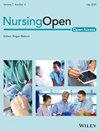Internationally qualified nurses' perspectives on transitioning specialty skills within Australia: A content analysis
IF 2
4区 医学
Q2 NURSING
引用次数: 0
Abstract
AimTo explore internationally qualified nurses' perceptions regarding the facilitators and barriers to specialty skill transfer in Australia.DesignThe study utilised a descriptive research design with a cross‐sectional survey. Data were collected from July to September 2022.MethodsA self‐designed survey was distributed through social media, snowballing and nursing professional organisations. The survey included six open‐ended questions which were analysed using thematic content analysis.ResultsSixty‐three participants completed the open‐ended questions in the survey. The findings identified a range of facilitators (support, previous experience, self‐agency) and barriers (systems barriers, bias/discrimination, being undervalued, lack of trust) to skill transition.ConclusionRecognising and addressing facilitators and barriers, coupled with creating customised pathways for specialty skill integration, are essential for optimising the utilisation of specialised skills in internationally qualified nurses.ImpactThis study aims to explore the barriers and facilitators involved in maximising skill utilisation among internationally qualified nurses in Australia. Identifying these barriers and facilitators is essential for improving patient care, as it will guide the development of strategies for safe nursing service delivery and the optimisation of skill usage. These findings hold significant implications for policymakers, healthcare organisations and nurses, providing valuable insights into how to address these obstacles and capitalise on the factors that make skill transfer smoother and more effective.Patient or Public ContributionSixty‐three internationally qualified nurses shared their experiences and opinions.国际合格护士对在澳大利亚过渡专科技能的看法:内容分析
目的探讨国际合格护士对澳大利亚专科技能转移的促进因素和障碍的看法。数据收集时间为 2022 年 7 月至 9 月。方法通过社交媒体、滚雪球和护理专业组织分发自行设计的调查问卷。调查包括六个开放式问题,采用主题内容分析法对这些问题进行了分析。结果63名参与者完成了调查中的开放式问题。调查结果显示了一系列技能过渡的促进因素(支持、以往经验、自我能力)和障碍(系统障碍、偏见/歧视、价值被低估、缺乏信任)。找出这些障碍和促进因素对于改善患者护理至关重要,因为这将指导制定安全护理服务和优化技能使用的策略。这些研究结果对政策制定者、医疗机构和护士具有重要意义,为如何解决这些障碍并利用各种因素使技能转移更顺利、更有效提供了宝贵的见解。
本文章由计算机程序翻译,如有差异,请以英文原文为准。
求助全文
约1分钟内获得全文
求助全文
来源期刊

Nursing Open
Nursing-General Nursing
CiteScore
3.60
自引率
4.30%
发文量
298
审稿时长
17 weeks
期刊介绍:
Nursing Open is a peer reviewed open access journal that welcomes articles on all aspects of nursing and midwifery practice, research, education and policy. We aim to publish articles that contribute to the art and science of nursing and which have a positive impact on health either locally, nationally, regionally or globally
 求助内容:
求助内容: 应助结果提醒方式:
应助结果提醒方式:


